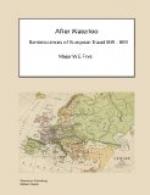Here the chesnut and olive trees salute the Ultramontane traveller for the first time. The olive tree, tho’ a most useful, is not an ornamental one, as it resembles a willow or osier in its trunk and in the colour of its leaves. The chesnut tree is a glorious plant for an indolent people, since it furnishes food without labour, as the Xaca or Jack fruit tree does to the Cingalese in Ceylon. On one of the heights between Pianoro and Lojano you have in very clear weather a view of both the Adriatic and Tyrrhene seas. We brought to the night at Scarica l’Asino and the next morning early we entered the Tuscan territory at Pietra Mala, where there is a Douane and consequently an examination of trunks. At one o’clock we arrived at an inn called Le Maschere, about fifteen miles distance from Florence; it is a large mansion and being situated on an eminence commands an extensive view. One becomes soon aware of being in the Tuscan territory from the number of cultivated spots to be seen in this part of the Appennines: for such is the industry of the inhabitants that they do wonders on their naturally sterile soil. One sees a number of farms. Every spot of ground is in cultivation, between Le Maschere and Florence in particular; these spots of ground, gardens, orchards and villas forming a striking and pleasing contrast with the wild and dreary scenery of the Appennines. Another thing that indicates one’s arrival among the Tuscans is their aspiration of the letter c before a, o and u, which is at first extremely puzzling to a foreigner accustomed only to the Roman pronunciation. For instance, instead of camera, cotto, curvo, they pronounce these words hamera, hotto, and hurvo with an exceeding strong aspiration of the h. It is the same too with the ch which they aspirate, ex gr. instead of pochino, chiave, they say pohino, hiave. The language however which is spoken is the most classical and pure Italian and except the above mentioned aspiration it is delightful to the ear; peculiarly so to those who come from the north of Italy, and have only hitherto heard the unpleasing nasal twang of the Milanese and the exceeding uncouth barbarous dialect of Bologna. Another striking peculiarity is the smart appearance of the Tuscan peasantry. They are a remarkably handsome race of men; the females unite with their natural beauty a grace and elegance that one is quite astonished to find among peasants. They express themselves in the most correct and classical language and they have a great deal of repartee. As the peasantry of Tuscany enjoy a greater share of aisance than falls to the lot of those of any other country, and as the females dress with taste and take great pains to appear smart on all occasions, they resemble rather the shepherdesses on the Opera stage or those of the fabled Arcadia than anything in real life.




